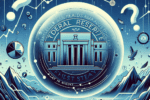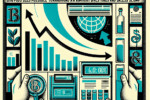New York, NY – Concerns about a potential recession in the United States are once again making headlines as indicators suggest a slowdown in economic growth. While there is still debate over the short-term outlook for the business cycle, certain metrics are pointing towards a deceleration that could spell trouble in the latter half of the year and into early 2025.
Despite some dissenting views that the economic expansion will persist, multi-factor indexes detailed in The US Business Cycle Risk Report’s weekly updates indicate a significant decline in the overall macro trend. Both the Economic Trend Index (ETI) and the Economic Momentum Index (EMI) are showing signs of weakening after over a year of recovery. Although these benchmarks currently remain above recessionary levels based on data through May, the trend suggests that the downward trajectory will continue.
Using advanced econometric models to forecast data for the 14 underlying components of ETI and EMI, projections indicate that both indexes are expected to drop just above their tipping points in July. This forecast raises the possibility of recessionary conditions emerging as early as August, although precise predictions remain speculative given the limitations in available data beyond March.
Another forecasting methodology, the Composite Recession Probability Index (CRPI), currently estimates a low 5% probability of the US being in or imminently entering into a recession as defined by the NBER. Nevertheless, recent increases in CRPI, coupled with the softening in ETI and EMI, could signal potential risks in the latter part of 2024 if the probability rises above 10% in the coming months.
Economists are now engaging in discussions on whether actions such as interest rate cuts could mitigate recession risks. Claudia Sahm, chief economist at New Century Advisors, warns against complacency, highlighting the urgency for proactive measures to prevent an avoidable economic downturn. She stresses the need for decisive actions to avert the possibility of an unnecessary recession, urging the Federal Reserve to act swiftly.
As the debate on recession risk intensifies, stakeholders are closely monitoring economic indicators and policy responses to navigate through potential challenges ahead. The evolving landscape of economic data and forecasts underscores the importance of proactive decision-making to safeguard against recessionary pressures in the months to come.










